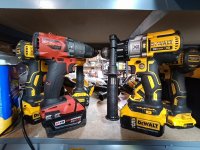5030
Epic Contributor
- Joined
- Feb 21, 2003
- Messages
- 28,967
- Location
- SE Michigan in the middle of nowhere
- Tractor
- Kubota M9000 HDCC3 M9000 HDC
Keep in mind that DeWalt and Milwaukee are made in the same factory in China and are owned by the same company which I believe is domestic but the tools are made offshore.
My issue with DeWalt has always been the batteries (I also have one) and the high replacement cost of the batteries coupled with the short working life. Rechargeable batteries all basically have the same (guts) inside power cells so I think it comes down to the quality of the cells themselves.
With DeWalt, the motors tend to fail for me but mine are brushed and the newer ones are brushless (just like the new Bauer's are). I do know the HF Bauer 20 volt cordless tools run longer on a charge and seem to run better which may be my imagination, not sure.
One thing I don't worry about with my cordless tools and that is the packs overheating and catching on fire (like the EV cars are doing, seem to be shorting out and catching on fire). The Bauer chargers which are pretty cheap, have 100% shutoff when the pack is fully charged so I'm not worried about them catching on fire from a forced over charge and setting my shop on fire. I can leave them in the charger for a protracted amount of time, and I do.
Li-Ion batteries are very touchy when forced to charge past a certain percentage and overheat and/or combust.
Like I said previously, cordless tools for me are about convenience but not about power delivered per charge.
In my humble opinion, Li-Ion battery technology needs to catch up to real world use and then the instances of them catching on fire will be minimal at best.
Like everything else today that involves technology, they (manufacturers) put stuff on the market without doing the necessary homework and exploring ALL possibilities of failure.
My issue with DeWalt has always been the batteries (I also have one) and the high replacement cost of the batteries coupled with the short working life. Rechargeable batteries all basically have the same (guts) inside power cells so I think it comes down to the quality of the cells themselves.
With DeWalt, the motors tend to fail for me but mine are brushed and the newer ones are brushless (just like the new Bauer's are). I do know the HF Bauer 20 volt cordless tools run longer on a charge and seem to run better which may be my imagination, not sure.
One thing I don't worry about with my cordless tools and that is the packs overheating and catching on fire (like the EV cars are doing, seem to be shorting out and catching on fire). The Bauer chargers which are pretty cheap, have 100% shutoff when the pack is fully charged so I'm not worried about them catching on fire from a forced over charge and setting my shop on fire. I can leave them in the charger for a protracted amount of time, and I do.
Li-Ion batteries are very touchy when forced to charge past a certain percentage and overheat and/or combust.
Like I said previously, cordless tools for me are about convenience but not about power delivered per charge.
In my humble opinion, Li-Ion battery technology needs to catch up to real world use and then the instances of them catching on fire will be minimal at best.
Like everything else today that involves technology, they (manufacturers) put stuff on the market without doing the necessary homework and exploring ALL possibilities of failure.

